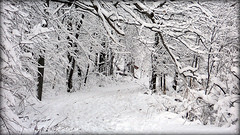Michael Patrick Clark's Blog, page 8
August 2, 2012
On why I wrote Flying with Cuckoos
 I locked away those memories, of childhood and my early youth, over thirty years ago; locked them all away in an unused corner of the mind’s attic and conveniently forgot where I had placed them. They were recollections of sadness and loneliness, emptiness and isolation. They were recollections of a life devoid of love, and a child’s emotional suffering.
I locked away those memories, of childhood and my early youth, over thirty years ago; locked them all away in an unused corner of the mind’s attic and conveniently forgot where I had placed them. They were recollections of sadness and loneliness, emptiness and isolation. They were recollections of a life devoid of love, and a child’s emotional suffering.
And so that was where I stored them, where I believed that such things should be stored; hidden away from the light of the present, hidden away in the attic of the past.
But then, many years on, and for why I couldn’t say, I re-ascended those old and rickety attic steps, clambered into the darkness, switched on the light, brushed away the dust, and re-discovered all those old memories in the place where they had once been so carefully concealed.
I thought long and hard before disturbing them, considering my purpose and all of those reasons why well should be left alone, but then simple curiosity caused me to fetch the sturdy oak casket, and its many fragile storage jars full of memories, and bring it all back into the light.
Once determined, I hurried to see if those old jars had remained intact over the years; forcing the casket’s lock and finding them to be just as I had remembered: each still tightly packed and sealed, and each still so full of so much pain and sadness.
But, it was only after I had prised the first stopper from the first jar that I found the most peculiar thing. I found the contents changed in every way imaginable.
I found colours, once considered brash and coarse, no longer as garish to the eye as I remembered. I found the breadth of flavours less bitter to the palette, the wealth of freed aromas less pollutant to the air.
I moved on from there to examine the next jar, and the next, and the one after that.
To my amazement the result was the same in each case; the contents no longer matched the labels.
Assuming they must have somehow mellowed with time, I rechecked each in turn; prising away each stopper and being strangely disappointed by the blandness that I continued to find.
It was not, however, until I had removed the last stopper from the last jar, and then read the label, compared it to the contents, and assessed the many inconsistencies, that I came to realise just what had happened.
It was not the contents, which had somehow altered over time, because they were precisely as they had always been; the colours just as vibrant and distinctive, the flavours just as intense, the aromas equally heady, equally evocative.
Any mellowing process, I finally came to understand, had been my own.

July 28, 2012
On the need for tenacity
 As writers we have to be tenacious, and I had always thought of myself as that. For months on end I research and learn and file, and research and learn and file. Then I sit at my keyboard, and slog away at the manuscript, from dawn til dusk. After that I edit and re-edit and edit again, until it all becomes a blur, and then I market and promote and re-market and further promote.
As writers we have to be tenacious, and I had always thought of myself as that. For months on end I research and learn and file, and research and learn and file. Then I sit at my keyboard, and slog away at the manuscript, from dawn til dusk. After that I edit and re-edit and edit again, until it all becomes a blur, and then I market and promote and re-market and further promote.
The whole process can, and in my case does, take years, with no guarantee of success or income at the end of it, and such a labour requires a fair degree of tenacity.
I had it in spades, or so I thought, but then one spring, a couple of years ago, I met the real deal.
He was a surly character, taciturn and uncommunicative. He arrived unannounced one night, and proceeded to dig a hole underneath my newly erected and hugely expensive garden fencing.
And, with that single act of mindless vandalism, he began a battle of wits and attrition that continued for the next six months.
We weren’t on speaking terms at the time, and so I never did discover his name. I simply referred to him as ‘that F*****g animal’ and then, much later, when my lovingly-tended lawn was littered with a criss-cross of tracks and scrapes and holes, I simply called him ‘The Badger’.
His means of ingress I never discovered, but his means of egress was patently clear. . . It was that newly-dug hole under my brand-new fencing.
And so I took a spade and set about the mound of earth that was now suffocating my newly-planted herbaceous border. I carefully and painstakingly uncovered the plants, brushed off the leaves, and then refilled the hole. With repair thus made, I selected a few stones and slates, scattered them over the repair, and then retired for a well-earned glass of wine.
The next morning both hole and mound of earth were back, if anything they were slightly larger, and battle was joined.
For the next three months I filled that hole with earth, I filled that hole with pebbles, I filled that hole with rocks, and I filled that hole with slate. The result was the same in every case: Badger 1, MPC 0.
The herbaceous border had long since given up the ghost when I decided to seek advice from some of the locals down at the village pub.
‘There’s only one way to get rid of a badger.’ They said. ‘You take a bucket, fill it with urine, and place it by the hole. . . he won’t come back.’
‘Neither would I.’
I warily studied them, not sure if they were joking at my expense (you will have undoubtedly have used your own expression). It seemed they weren’t.
So that was it. I could either turn my fragrant English country garden into something akin to an inner-city public lavatory, or capitulate to a dumb omnivore. There had to be another way.
For the next two months I persevered with the rocks and stones, and for the next two months that damned animal thwarted my every effort. . . but then a brainwave.
‘Cement! I’ll fill it with cement’.
And so off I went to the DIY store; returning with a large bag of cement and a large bag of sand, which I then mixed into concrete before filling the hole. The result was proudly shown to my unconvinced wife, as I smiled a smile of knowing superiority and said. . . ‘Let’s see him dig through that.’
He didn’t. In fact, the lump of cement is still there now; I can’t get it out.
Unfortunately, so is the hole that he then dug, three yards farther away, behind one of my prize conifers. The same hole that my wife took tremendous delight in pointing out to me a few days later.
You may wonder if winter, and hibernation, brought some respite. . . it didn’t, and he doesn’t.
Today the badger and I are still not on speaking terms, although we have come to a mutually acceptable arrangement. . . He goes wherever he wishes, and does whatever he pleases, and I try not to notice.
Perhaps, when it comes to persistence and tenacity, that’s why people use the term ‘to badger’ rather than ‘to author’.
Have a good one.

July 24, 2012
Happiness
On what makes us happy.
I watched Breakfast TV today.
The presenter voiced one of those searching questions. It was not one of those questions where the station receives ten thousand answers, cherry-picks three or four that legitimize the desired point of view, and then claims overwhelming public support for an opinion the station held, but didn’t have the guts or legal approval to give.
This was a good question; a question that I partially addressed in Flying with Cuckoos.
It asked, what makes people truly happy?
Ask people what makes them happy, and you will get a wide variety of answers: love, money, fame, success at work, a solid relationship, a good book, a walk in the countryside, a beautiful girlfriend, a good-looking boyfriend, a fast car, a designer handbag. All these, and an infinite number of other answers, will inevitably spew forth. But are these true happiness factors, or merely reflections of circumstance?
You see, I believe lasting happiness is nothing to do with any of that. I believe that lasting happiness is all to do with contentment, and contentment is often to do with being realistic.
You don’t agree? Well, O.K. then, remember the little fat boy at school, the lonely one with the McDonalds’ quantity discount card and raging acne; the one everybody sniggered at and did their utmost to avoid. When he was at school, longingly admiring some precocious Lolita with long blonde hair, piercing blue eyes, and a proud rear end, he couldn’t have been more miserable. He would have secretly both adored and hated her and all of her fickle and vindictive friends when they scoffed at his tubby unattractiveness and laughed at his clumsy infatuation.

He would have failed just as miserably on the football field, or the athletics track, or in the gymnasium, and he would have both envied and hated the other boys for their superior abilities and cruel contempt for his pitiable athleticism. And, as he trudged home at the end of each long and painful day, he would have hated himself for his perception of failing in that which truly matters to athletic young studs and precocious Lolitas alike.
But then, look again at that same little fat boy, years later, when realism’s harsh and invaluable lessons have been learnt. No more does he dream of precocious Lolitas. He may glance and imagine, because that is part of mankind’s fun in living, but the pain of unrealised desire has gone. You see, he gained reality. He married unfancied Penelope, from the cooked meats counter at the local supermarket, and he achieved peace of mind.
Now he has a loving wife, a devoted mother, and a caring family to return to each night, and although being married to unfancied Penelope may not in itself generate envy, over the months and years he has come to understand that the admiration and envy of other men is not always in itself to be envied.
Nor does he any longer attempt to compete in the sporting arena, because he now sees such competition for what it truly is; a momentary entertainment for the masses, and a failure waiting to happen for the fleetingly-triumphant gladiators.
And so, instead of heading off in search of fickle triumph, he hurries home to the ample bosom of a loving family; therein discovering his true self, and lasting contentment.
You see, our little fat boy has achieved something special since those lonely days at school. He stopped grasping for the unobtainable, replaced envy’s malcontent with realism’s peace of mind, and discovered lasting happiness.
Anyway, that’s about it for this post. . . I’m off to see how far my books have climbed on Amazon’s best-seller listings.

July 12, 2012
First Post

Welcome to this, my first post as the writer of a blog.
I know nothing about blogging. There, I’ve said it; it’s out there. In fact, this whole blogging ‘thing’ is the result of a conversation that went something like this. . .
“You’re going to need to start a blog.”
“Why?”
“Because people are going to want to know something about you.”
“Why?”
“Because you’ve written two books, and you’re in the middle of writing a third, and they’re starting to generate interest.”
“Well, let people read the books; that’s why I write them.”
“Yes, but people are also going to want to know something about you, as a person.”
“Why?”
“Because people are interested in that sort of thing.”
“Why?”
No, this wasn’t a conversation between a five-year-old child and its frustrated mother, but between yours truly and Pam, my long-suffering wife, who designs my book covers and runs my website.
You see, I dislike the celebrity culture that seems to have the western world in its grip, and starting a blog, when I haven’t even reached the long list that will one day become the short list that may eventually become someone’s minor-celebrity Z-list, struck me as exacerbating the problem.
But then Pam added the clincher. . .
“You’ll get to give them your opinions.”
There it was; proof, if proof were needed, that Pam wraps me around her little finger. And if I had ever doubted that she knows me better than I know myself, there that was too.
“Really?”
“Oh yes.”
“Well, I suppose I could take a break every now and then.”
That was that, wrapped around, spun around, and dragged, kicking and screaming, into the 21st Century, before I’d had a chance to draw breath. And here I am now, frantically scanning the memory banks for any odd snippets that might mildly titillate.
Not that I’m a stranger to technology; in fact I’ve designed, and consulted on, some of the world’s most complex and sophisticated computer networks, but that all seems like such a long time ago. You see, I can explain the seven-layer architecture that underpins data networks, in some detail. I can discuss physical and electrical properties, and protocols and interfaces, with the best of ’em, but don’t ask me which keys to hit to hit, and in which order, because when it comes to using those constantly evolving applications that perch on the communications subsystem, I haven’t got a clue.
So here I sit; racking the brains and coming up short.
I suppose I could tell people about my likes and dislikes; about our family and our five Burmese cats, and why I love Rioja, and why I play golf, and why I still love to fish, and what I’m writing and how it’s going, when I’m not doing this blog, and the books I’ve read and loved, and the films I’ve seen and loved, and where we live, now, and where we’re moving to, and raindrops on roses and whiskers on kittens, and all those other favourite things.
Maybe I could tell you a little more about the places I’ve seen. Perhaps I could tell you about my days, how I fill them, and how they never seem to be long enough. Perhaps I could even drop in the odd never-before-told juicy story, about some of the famous people I’ve met in my life. . . well, no, perhaps that would be taking my capitulation to the celebrity culture to extremes, but maybe the rest of it.
That’s if you’re interested?
If not, I’ll have to think of something else.








